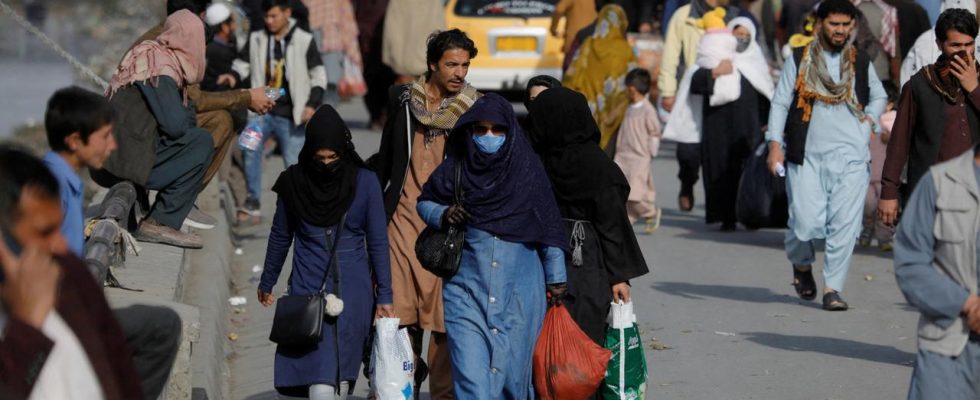Germany has significantly reduced its financial aid to Afghanistan. Politicians argue about whether this is correct. Aid organizations are pushing for greater commitment.
Hans-Hermann Dube puts it bluntly when asked about German help for the people in Afghanistan. “We’re letting them die at the moment,” says the 70-year-old retired civil servant from Schleswig-Holstein. “And that makes me very nervous to see that we have a rather ignorant German policy.”
Dube lived in Kabul for several years and from 2002 to 2015 managed development projects for the state-owned German Society for International Cooperation (GIZ). In order to implement the projects, he spoke to everyone involved on site, including the Taliban. He is convinced that this must also happen now: “We will have to live and work with this government, whether Taliban or whoever, to help people so that they no longer have to flee this country.”
Hans-Hermann Dube (right) from GIZ.
Dube is vehemently in favor of resuming full-scale development aid to enable Afghans to work to survive. “That would be the best way to help the country.”
non-governmental organizations appeal to federal government
In February, 22 German non-governmental organizations appealed in a letter to Federal Foreign Minister Annalena Baerbock to “allow humanitarian work to its full extent again – politically and financially” and to fulfill the German government’s promise “not to let the people in Afghanistan down”.
Welthungerhilfe Managing Director Mathias Mogge said now NDR infohumanitarian emergency aid is going on, but with more money from international and German donors, including for development aid projects, “much more could be implemented”.
From 330 million to 39 million euros
But that is currently not a majority in the traffic light coalition. While the SPD is demanding not only emergency aid but also a resumption of development aid, the FDP, Greens and the Foreign Office are currently rejecting this. Among other things, they refer to the decree of the Taliban leadership that prohibits women from working for aid organizations. This was the result of a query by the parliamentary groups and the ministries involved NDR info.
The Federal Foreign Office says that 39 million euros in humanitarian aid for Afghanistan have been pledged for 2023. In 2022 it was still 330 million. The German Development Ministry (BMZ) currently only finances projects to secure basic human needs. Extensive development projects like before the Taliban took power are on hold. According to a ministry spokesman, the extent of the commitment depends on “whether and to what extent it will be possible to work with women for women in Afghanistan”.
Aid organizations report that in many regions help is also possible with the participation of women in consultation with the local Taliban officials. “We still have the impression that we can ensure that the aid reaches those most in need,” says Mathias Mogge from Welthungerhilfe. Even with women and children, “we can still guarantee that”.
Coalition deeply divided
The deputy SPD parliamentary group leader Gabriela Heinrich said NDR info expressly also with reference to development aid: “Wherever you can reach people directly with organizations, you have to keep doing it, you have to keep trying, as long and as far as possible.”
On the other hand, the development policy spokesman for the FDP parliamentary group, Till Mansmann, said: “Under the current conditions, development cooperation is simply not possible and should be suspended – also so as not to support the policies of a misanthropic regime”.
Green MP Shahina Gambir only advocated humanitarian aid and called on the Taliban to lift the ban on women working in the country. “The Taliban deliberately disadvantage women as a target of humanitarian aid. They prevent life-saving aid for their own population. They take them hostage.”
Gabriela Heinrich from the SPD spoke of a dissent in the coalition, the resolution of which was a question of talks and time, because other countries are currently stepping up their activities in Afghanistan.
FDP and Greens fear giving the Taliban the wrong signal
In order to support aid organizations in their work on site, Welthungerhilfe proposes the reopening of the German Embassy in Kabul at the working level. SPD politician Heinrich also supports this. However, the FDP and the Greens strictly reject it and see it as sending the wrong signal to the Taliban government.
The Foreign Office said that in view of the latest political developments there are currently no plans to reopen the embassy in Kabul. It is clear “that with international aid we cannot make ourselves the henchman of the Taliban, whose actions contradict fundamental humanitarian principles”.
Opinions also differ greatly in the opposition. The Left Party member of parliament, Sevim Dagdelen, spoke out in favor of comprehensive development aid and the opening of the embassy. She is against wanting to use the Afghanistan aid as a means of exerting pressure. “It is a cheap illusion to be able to change the reactionary policies of those in power in this way. We urgently need a humanitarian turnaround in German Afghanistan policy,” said Dagdelen.
“Developmental a bottomless pit”
The CDU foreign policy expert Jürgen Hardt, on the other hand, called for concessions from the Taliban: “When we organize development aid projects or aid projects, then of course we always have to ensure that human rights and fundamental rights are respected. That is not guaranteed.”
The development policy spokesman for the AfD parliamentary group, Markus Frohnmaier, sees “currently no basis for further aid”. Afghanistan’s problems cannot be solved from outside, Germany should withdraw. “Afghanistan is a bottomless pit in terms of development policy,” he warned.
Despite all the grudge against the German government, Dube has hope for Afghanistan despite the precarious humanitarian situation. “I’ve lived in the country for so long and I know the people,” said the retired officer from Bordesholm. “I’m in daily contact, including with the current Afghan government.” He therefore knows that “these people want the situation in the country to improve”. And that’s why the situation will change.

